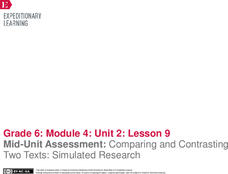Curated OER
Vocabulary Charts
Help your kids learn their vocabulary with a lesson plan and graphic organizer. After receiving a list of new vocabulary words, learners look up the definitions in dictionaries and fill in the worksheet. Additionally, they include a...
Curated OER
Hoot: Vocabulary Squares
Study the vocabulary from Carl Hiaasen's Hoot with an activity featuring synonyms and antonyms. Kids fill in a graphic organizer for each word, prompting critical thinking as they find additional ways to put the word into context.
Curated OER
Hatchet: Vocabulary Strategy
Want your class to use critical thinking when discussing vocabulary? Go beyond the dictionary with a vocabulary activity based on Gary Paulsen's Hatchet. Kids write the word in the center of a graphic organizer that also provides places...
Vocabulary A-Z
5-Day Vocabulary Teaching Plan
Reinforce important reading skills with a set of vocabulary lesson plans. Middle schoolers complete sentences, play word games, finish analogies, and build their growing vocabulary with a packet of helpful and applicable graphic organizers.
2012 Teaching Resources
Analyzing Character Traits
Character analysis becomes easy with a 24-page packet packed with mini-lessons, graphic organizers, and activities. A must-have for your curriculum library.
Curated OER
Using Prefixes, Suffixes and Root Words to Improve College Level Vocabulary
Grow vocabulary skills with an understanding of affixes and word roots. Included here are a few activities and plenty of materials you can use to support your learners as the focus on building vocabulary.
Curated OER
Study Guide for Missing May
Use this comprehensive packet to accompany a study of Missing May by Cynthia Rylant. Starting out with a brief author biography and background information about the novel, this guide includes materials to use throughout the entire novel....
Scholastic
Citing Text Evidence
Could you go without your cell phone for 48 hours? Pose this question to your class and then read the article provided here. Pupils mark the text and and complete a graphic organizer that requires the use of textual evidence.
EngageNY
Carl Hiaasen’s Perspective of Florida: Part 2
Look it up. Scholars read Florida: A Paradise of Scandals Excerpt 1 and use a dictionary to look up any unfamiliar words. They then do a close read of the text and answer text-dependent questions. Learners analyze author perspective by...
EngageNY
Mid-Unit Assessment: Comparing and Contrasting Two Texts: Simulated Research
Shoo fly. Scholars read DDT Spray Scares Mosquitoes Away, Study Finds and You Think You Have It Tough? to complete a mid-unit assessment. The learners compare and contrast author presentation and conduct a credibility check on each...
National Park Service
A Tale of Two Men
Theodore Roosevelt and the Marquis de Mores were both born in 1858, and both came to the Dakota territory in 1883, but they influenced the developing country of America in different ways. Elementary and middle schoolers apply written and...
EngageNY
Introducing “If” and Noting Notices and Wonders of the First Stanza
After reading chapter 14 of the story Bud, Not Buddy by Christopher Paul Curtis, scholars take part in a read-aloud of the poem If by Rudyard Kipling and compare it to the reading of Bud, Not Buddy. Learners then go deeper into the poem...
EngageNY
Notices and Wonders of the Second Stanza of “If”
Here is an instructional activity that asks pupils to analyze poetry and sparks discussion about two different types of texts: asking how is the poem, If by Rudyard Kipling alike and different from the story, Bud, Not Buddy by...
Meadows Center for Preventing Educational Risk, University of Texas at Austin
Lesson 15 - Soft G and Soft C
The names Cindy and Carrie start with the same letter, but have very different sounds. The 15th of 17 word recognition lessons focuses on the soft C sound found in Cindy and the soft G sound found in Gene. Direct instruction starts with...
EngageNY
Mid-Unit Assessment: Tracing an Argument in an Article and a Video
Pesticides—unnecessary pollutants or positive application? Learners watch a video about DDT and read Rachel Carson: Sounding the Alarm on
Pollution for their mid-unit assessment. They complete graphic organizers, answer multiple-choice...
McGraw Hill
Study Guide for Island of the Blue Dolphins
Dive your class into a reading of Island of the Blue Dolphins with this in-depth study guide. Breaking the novel into three parts, the resource begins each section with a focus activity that identifies a specific theme or question to be...
Literacy Design Collaborative
Exploring Character Development in The Watsons Go to Birmingham - 1963
How did the Civil Rights Movement affect young people in the United States? Scholars read Christopher Paul Curtis' novel, The Watsons go to Birmingham - 1963. Next, they write compare and contrast essays showing how the main characters...
Curated OER
Walk Two Moons: Hook and Concept of a Frame Story
As an introduction to Sharon Creexh's Walk Two Moons, a volunteer dons a pair of boots and walks about the classroom.Observers then ponder the axiom, Don't judge a man until you've walked two moons in his moccasins. Their collaborative...
EngageNY
Presentation of Events: Comparing Two Authors
Give a little clue! Readers learn how context clues can help them determine the meaning of words by viewing a Context Clues Resource sheet then completing a Context Clues
practice sheet. They then compare events presented by two...




















